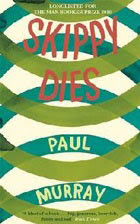
SKIPPY DIES is an enjoyable and complex novel, which can’t decide if it’s a tragedy or a comedy.
It’s 616 dense pages, dealing in great detail with a group of fourteen year old boys at a Catholic boarding school, in which tone, theme, and character perspective are all constantly changing.
Any Harry Potter type fantasies tend to get squashed pretty quickly: life in the Tower, an ancient building composed mostly of draughts, is a deeply unmagical experience, spent at the mercy of lunatic teachers, bullies, athlete’s foot epidemics, etc. There are some small consolations. At a point in life in which the lovely nuturing homes built for them by their parents have become unendurable Guantanomos, and any time spent away from their peers is experienced at best as a mind-numbing commercial break for things no one wants to buy on some old person’s TV channel and at worst as a torture not incomparable to being actually genuinely nailed to a cross, the boarders do enjoy a certain prestige among the boys.
Clearly, much of the book is very funny. As the title suggests however, all is not entirely well. Skippy is the student Daniel Juster, who falls madly in love with a girl from a neighbouring school. He is an unhappy and mildly dorky boy, who can’t seem to get up the courage to quit the swim team, which he seems to hate, though the reason for this is not clear. He eventually overdoses on painkillers.
Don’t be mislead into thinking that this is the story of the novel. There are about six major stories: one for Daniel, one for his history teacher, one for this room mate, one for the girl he’s in love with, etc etc. Some of these stories are comic, some sad, all are interesting. There’s a compelling examination of the extent to which the old are ranged against the young, and vice versa, and Robert Graves’ GOODBYE TO ALL THAT (reviewed by me here), about the First World War, is referenced often:
We no longer saw the war as one between trade-rivals: its continuance seemed merely a sacrifice of the idealistic younger generation to the stupidity and self-protective alarm of the elder.
This idea, of the young as constantly betrayed by the old, is very interesting. All is going very well, in short, for the first two thirds of the novel, until sadly the author begins to build in climaxes for each story, and oh god, but they are cheesy.
Guess why Skippy hates the swim team: yes, yes, got it in one, he is being abused. Guess what happens when Skippy’s girflriend gives someone a blowjob to prove she loves him: he records it on his phone. You get the idea. It’s all what elderly newspaper critics would describe as ‘gritty.’
Unfortunately the thematic resolutions are as cheesy as the plot resolutions. Here’s something:
Maybe instead of strings it’s stories that things are made of, an infinite number of tiny vibrating stories.
If I had a penny for every novel that concluded that our lives are just stories I would puke.
Or try this
So this guy’s saying, instead of searching for ways out of our lives, what we should be searching for are ways in . .
Oh dear.
